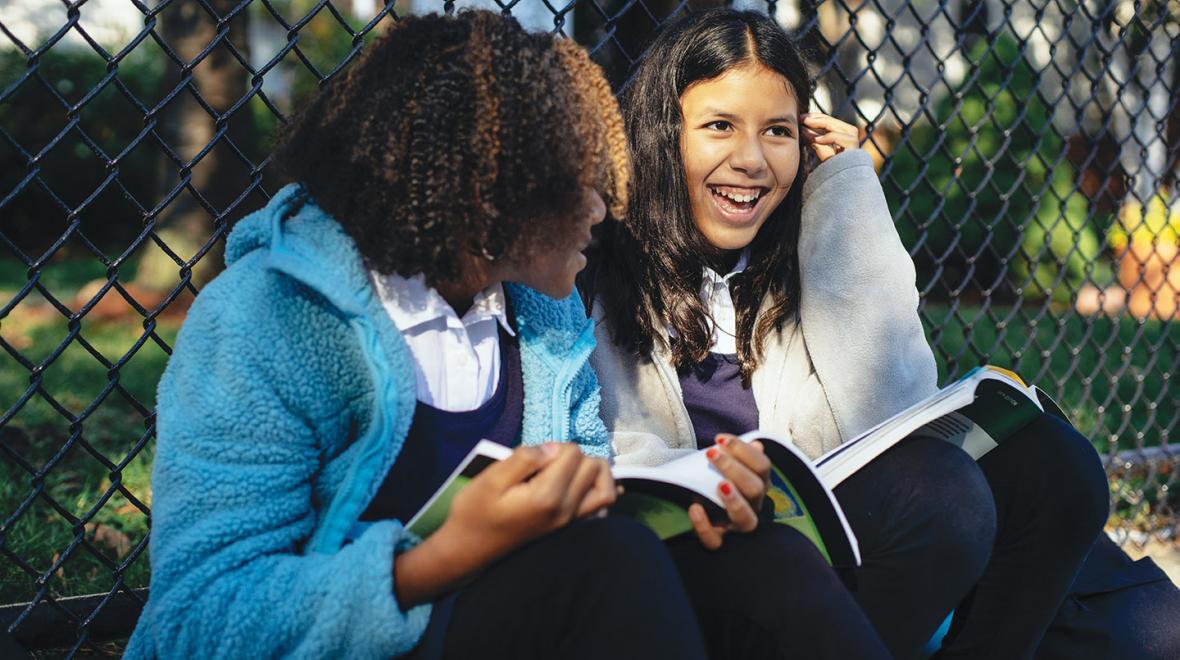
Editor's note: This article was sponsored by Seattle Children's Hospital.
As children face and embrace the excitement and uncertainty of a new school year, it’s natural for some anxiety to arise, says psychologist Nicole Stettler, Ph.D.
While it’s tempting to exuberantly reassure or attempt to insulate kids from such feelings, it’s more important, she notes, to help them develop their own skills for facing such life transitions.
“We can’t control or avoid all of the things that are stressful and unpredictable,” says Stettler. “Getting practice ahead of time can help them think through what will happen and build confidence.”
Stettler offers the following age-tailored tips for helping your child manage any back-to-school anxiety, from preschool through the high school years.
Coping tips for preschoolers and other littles
Our youngest scholars are still learning what school is like and what to expect. That’s why it’s especially important for parents to help them visualize how their day will go. For example, a child might wonder what their classroom looks like, or how they should interact with a teacher and classmates.
Stories can help bridge knowledge gaps and imbue young students with more confidence. As you read books together, discuss how the characters might be feeling. Approach these scenarios with a sense of curiosity and positivity, exploring different possibilities and outcomes.
Practicing can be an especially useful tool for this age group. Consider visiting the school with your child in advance, even if it isn’t open. Just seeing the campus — the exterior of the school building, the playground, etc. — creates a sense of familiarity that will make the first days of school a less daunting proposition. Go on a “dry run” by practicing a bus ride or the car drop-off route. Even a seemingly simple step such as packing a backpack in advance can ease first-day jitters. Have your child practice basic social skills by visiting a neighborhood playground together and encouraging them to introduce themselves to someone new.

For the very youngest students, it may be useful to practice separating and reuniting with a parent. Leave your school-bound child for brief periods, such as the time it will take you to go collect the mail, and then work your way toward longer separations, during which you leave them with a trusted caregiver.
On the morning of the first day, parents and guardians play an important role in creating a relaxed environment. Be sure to build in extra time and space for everyone to get ready. That way, any snags in the schedule won’t be as stressful. If you decide to do something extra, such as prepare a special breakfast or stage a fun first-day photo shoot, make sure there is ample time.
Stettler encourages rewarding your child for their “brave” behavior after that first school day is done. Celebrate the successful conclusion of their first day with a stop at a favorite neighborhood park to play or at a favorite ice cream shop for a treat (or both?). This reward doesn’t have to be a specific item or event; it can be as simple as having focused attention from a parent. Use your attention to spotlight — and further bolster — resilient behavior.
While it’s emotionally agonizing to drop off a crying child at school and leave, consider the message you want to send, Stettler advises. If you give up and spirit your child back home, the message you might be communicating is that school is a scary place, or possibly worse — that your child can’t handle going to school. Instead, reinforce the key message while being empathetic: Yes, being separated from loved ones is hard, but school is a safe place to learn, make friends and have fun.
It’s elementary
As children grow more accustomed to the school setting, social interactions become increasingly important. Elementary school students might be fearful of teasing, bullying and social rejection. There may also be some anxiety about achieving good grades and gaining teacher approval.
Help your child work through some potential problems that might arise and how they can handle them. Prompt them with questions that encourage their own problem-solving capabilities and analysis.. For example, ask your child how they might handle a situation in which their best friend is assigned to a different classroom. Can they think of other ways to maintain that important friendship? How will they approach forming friendships in their new classroom?
At this stage, the focus is on developing their own ideas versus offering solutions. Use a light-hearted, curious approach to navigating the possible challenges and exciting opportunities ahead.
It also may be helpful for parents to share their own memories about navigating school experiences and childhood friendships. Describing your own childhood experiences and how you handled them might spur a fruitful conversation about coping mechanisms.
If your child is not interested in engaging on such topics, you can still validate these stressful experiences. Stay away from assumptions and stick to the facts: “I know school is coming up. A lot of kids might feel stressed about school or sad that summer is ending. I don’t know if that’s true for you, but, if so, it’s normal, and I’m happy to talk about that with you.”
Once that conversational seed is planted, kids might bring up the topic on their own later.
Middle and high school rules
Natural sleep schedules tend to run later for middle school- and high school-age kids. If bedtimes have become progressively later during the summer, start adjusting them well before the first day of school. A sudden shift can jolt the system, says Stettler.
As your child gets older, they may be less likely to openly share their feelings about the upcoming school year, turning instead to peers for support. Still, there may be signs that your child is experiencing stress. As the summer concludes, they may “overdo” things, such as organizing school supplies or watching academic videos in preparation for the forthcoming curriculum. Or they may do just the opposite and avoid anything related to back-to-school activities or preparation.
You may also observe mood changes, such as increased signs of irritability or argumentativeness. There might be underlying anxiety motivating this behavior. That’s why it’s important to react with patience and curiosity regarding what might be driving the shift in mood or behavior.
As children enter middle school, help them visualize and mentally prepare for a new and dynamic environment. They will likely have multiple teachers and classes, as well as exposure to a wider community of kids. Help them mentally prepare for their days and possible challenges: What might an average day look like? What are some strategies you can employ to handle a classmate who is teasing you?
At this stage, many fears surface about how others perceive them as well as their school performance. Even though your child might not be sharing these precise concerns, it’s still validating to hear a parent address these worries. Give them an opening for conversation by recounting how you felt when you entered middle or high school. When people reveal vulnerabilities, others tend to respond by doing the same.
|
Sponsored by: |












